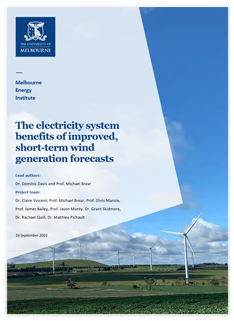This analysis quantified the complex interactions between short-term renewable generation forecasts, demand forecasts, generator unit commitment and economic dispatch.
Report extract
 This analysis quantified the complex interactions between short-term renewable generation forecasts, demand forecasts, generator unit commitment and economic dispatch. Studies with current short-term wind forecasting errors (Reference) were complemented by studies with High (×2), Low (×0.5) and Perfect (zero) forecasting error.
This analysis quantified the complex interactions between short-term renewable generation forecasts, demand forecasts, generator unit commitment and economic dispatch. Studies with current short-term wind forecasting errors (Reference) were complemented by studies with High (×2), Low (×0.5) and Perfect (zero) forecasting error.
Less accurate short-term wind forecasts of course results in greater operational uncertainty. This analysis showed that this:
- increased the scheduling of thermal plant and energy storage to maintain system reliability and security; and
- increased renewable curtailment since thermal plant and storage are then more available.
Market performance then deteriorated, with:
- increased hours of unserved energy and time spent at the market price cap;
- increased total system costs and prices;
- significantly increased returns to thermal generators and energy storage;
- reduced returns to wind generators;
- slightly increased emissions; and
- significantly increased risks of system insecurity (i.e. loss of frequency control) since renewables displace synchronous generation and increase operational uncertainty.



